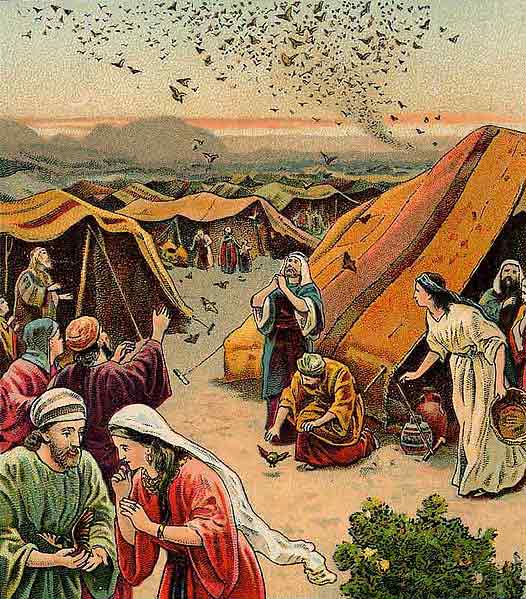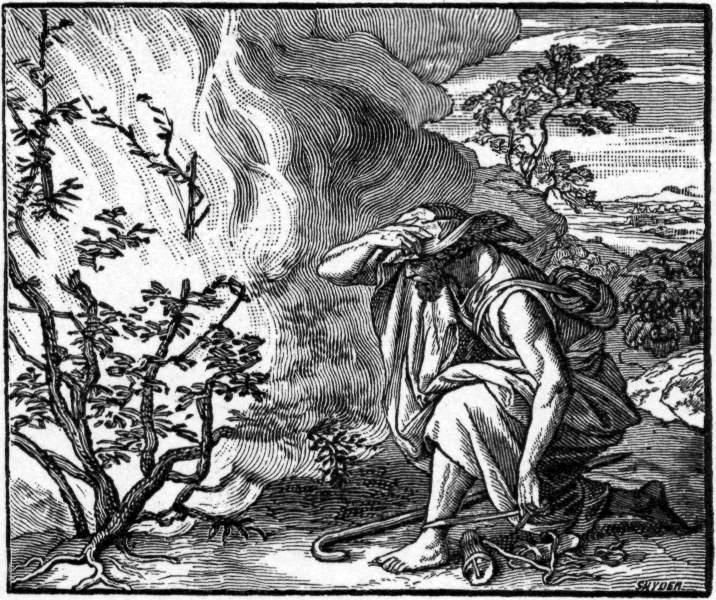 Thus, the grace and blessings of God successfully averted the threat that the Pharaoh, all along in hot pursuit, meant to the Jews. Free from fear, they now proceeded with their journey. They traversed human settlements, leaving behind habitation of all kinds and were soon trudging across barren desert land.
Thus, the grace and blessings of God successfully averted the threat that the Pharaoh, all along in hot pursuit, meant to the Jews. Free from fear, they now proceeded with their journey. They traversed human settlements, leaving behind habitation of all kinds and were soon trudging across barren desert land.
They were now fast running out of their supplies of food and water. Also, with the desert surrounding them, vegetation and animals had already become a rare sight. It was under these conditions, that they reached ‘Marah’.

After a long search they finally managed to find a spring. But their joy of finding it was short-lived as its waters turned out to be bitter, salty and non-potable.
Enraged with disappointment and weary with thirst and hunger, many of them again started to grumble to Moses. He again sought the mercy of God for them. God then directed him to a tree not far from them and commanded Moses to pluck a branch and throw it in the waters of the spring. The moment he did so, the water which earlier tasted bitter, salty and was non-potable became sweet and potable; everyone drank it to their heart’s content.
At this point, God set certain guidelines, certain regulations for the Jews and gave them His word that should they observe these and at all times do what He permitted as appropriate, the kind of calamities that the Egyptians were subjected to, would never come their way.
Advancing further, they reached a place called ‘Elim’. Though part of the desert, this place had twelve wells full of water and seventy palm trees. Gladly thanking God for the food and water He had provided for, the Jews took some rest and proceeded further with their journey.

It was almost a month since they left Egypt. They were now on the road to Mount Sinai in the desert of Zin. Once again thirsty and hungry, some from the Jewish assemblage began to curse Moses for bringing them to the desert. “Did you get us here so we die of hunger? Be it in slavery, life in Egypt atleast gave us a square meal” they asked!
God then told Moses, “Now on, I am going to send you divine food from the skies. In the mornings it will rain bread and in the evenings, I will provide meat. You will eat bread for your morning meals and meat for your evening meals. But all of this, on one condition! – Each of you will gather as much food as is essential for your household for one day. Neither more, nor less. No food will be kept for the next day. You will have food from the skies every day, the only exception being Friday, on which day you will take home twice as much as you do, on other days. The following day, a Saturday, will be the day of ‘Shabbat’. Food will not rain on Saturday. Also, you will not step out of your homes to gather food as part of your observance of ‘Shabbat’. The gathering of twice the food required was an exceptional rule that applied only to the two days of Friday-Saturday. On the other days you will take home food essential only for a single day.

The Jews experienced all of the above on the very day God said it. By evening, a number of quails had gathered at the place; they were exactly enough to feed this entire congregation of the Jews. When they woke up the next day they found dewdrop-like grains spread all over the ground. They had not seen these grains before. The grains tasted like bread dipped in honey.
Everyone joyfully gathered a quantity that would be enough for the whole of their family for a day. They called it ‘Manna’ (‘Bread from heaven’). From then, the morning bread and the evening quail saved the Jews from being starved. Amazing was the fact that even if it so happened that the food collected fell short of the actual requirement, the family did not go hungry. There was always enough to satisfy all the family members.
But there were a few who defied God’s command and gathered more than the essential quantity of food, even on days other than Friday-Saturday. But it was of no use in any case as on the next day the food rotted and stank. Only the food gathered on Friday did not rot and remained edible for the next day.
Then there were others, who gathered food only for a day on Friday. Moreover, they even ventured out in search of food on Saturday and did not observe the ‘Shabbat’. They ended up returning empty handed and were forced to go hungry for the entire day.
This disobedience of God on the part of some, angered Moses, who looked upon this act as one of irreverence. He strongly rebuked the offenders. “Why do you disrespect the ‘Shabbat’? It is a beautiful gift of God. Realizing their mistake they amended their ways and began to follow God’s word.
Many scholars are of the opinion that for the Jews, this incident holds a lesson viz. ‘God is not bound to give to you, what you want. He gives only that, which is apt for us or that which we need.’ (To be continued…)
– Shulamith Penkar-Nigrekar
(Shabbat –‘Shabbat’ is a beautiful concept belonging to the Jewish culture. According to the belief of the religious Jews – the word of God caused everything to come into being (mountains, rivers, sky, planets and stars, animals, humans, etc., in fact everything that be in the cosmos). (‘The Creation of the World’). It happened in steps and staggered over six days. On the first day, God said, “Let there be Light” — and there was Light. On the second day God made the sky and called it Heaven. On the third day, God put the earth into shape. At His command the waters formed seas, oceans, lakes and rivers. At God’s further command, the earth produced all kinds of plants, grass, trees, shrubs and flowers. On the fourth day, God made the sun, moon and stars, and also set the time. On the fifth day, God filled the seas with fishes and other animals. Into the air above the earth He put birds. On the sixth day, all the other animals were created. And towards the end of the sixth day, God put a divine soul into a body which He made of earth and clay. This was the human. On the seventh day as everything was created and put into shape and order, God rested.

The seventh day – the day of rest for God is an important day for the religious Jews. This seventh day is known to the Jews as ‘Shabbat’. Shabbat is observed by Jews on the Saturday of every week with profound respect and devotion. The Jews consider Shabbat as a beautiful gift by God and eagerly await it for the entire week.
The period of the Shabbat stretches from a few minutes before sunset on Friday evening upto a little after sunset on the following Saturday evening. Special meals are prepared on this day. On this day, religious Jews keep themselves completely free from any engagements. For them it is a time to be quiet, to refrain from the spoken word and give in as much as possible to contemplation and introspection. They light candles and pray to God. It is also, they feel, a time meant to be devoted to silent reflection over the whole of the week gone by. They thank God for all the good that might have come their way in the week and they seek His forgiveness for the wrong they might have done. They also recite the name of God. This being their tradition, a discipline they have consistently observed, it has been naturally handed down through generations. The importance of the Shabbat is impressed easily on young minds who accept and observe very respectfully, this tradition. Hence a religious Jew, may he be in any corner of the world, does invariably observe the Shabbat.)












